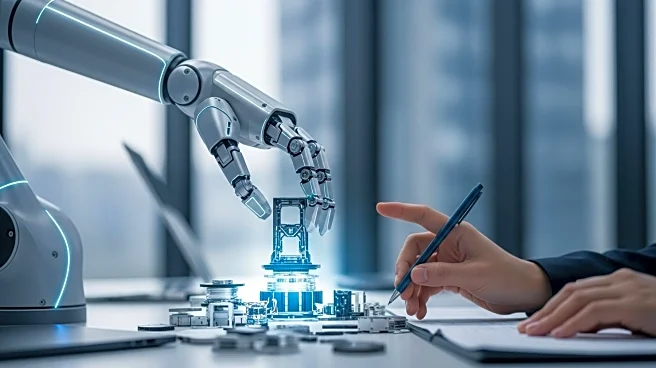What's Happening?
Goldman Sachs Group Inc. Chief Executive David Solomon has presented a vision where artificial intelligence (AI) will expand the bank's workforce over the next decade, contrary to fears of job losses. Speaking at a conference in Italy, Solomon argued that while AI will automate certain tasks, it will also create new opportunities requiring more human talent. This perspective challenges the broader industry debate on AI's impact, where many firms anticipate efficiency-driven layoffs. Solomon emphasized that technological advancements like AI evolve organizations rather than shrink them, citing historical precedents where innovations boosted productivity without net job losses. Goldman Sachs plans to heavily invest in AI to enhance operations, from risk assessment to client services, without leading to widespread redundancies. Instead, AI is expected to enable the bank to tackle more sophisticated projects, requiring specialized roles in data science, ethics oversight, and AI integration.
Why It's Important?
The implications of Solomon's vision are significant for the financial industry and beyond. If AI can indeed expand the workforce, it could shift the narrative from AI as a job killer to a growth catalyst. This could influence how other financial institutions and industries approach AI integration, potentially leading to increased investments in AI technologies. For employees, this could mean more opportunities in emerging fields related to AI, such as data science and AI ethics. However, Solomon's optimism also comes with a warning about potential market corrections tied to AI hype, suggesting a need for balanced investment strategies. The broader economic impact includes potential job creation across sectors due to AI infrastructure buildouts, which Solomon sees as key drivers of U.S. growth into 2026.
What's Next?
Goldman Sachs plans to continue its investment in AI, with Solomon expressing a desire to spend up to $8 billion annually on technology if budgets allow. This commitment to innovation over austerity positions Goldman as a leader in adapting to AI advancements. Industry watchers will be monitoring whether this approach pays off, especially as market corrections loom and AI investments face scrutiny. The focus will likely shift to hybrid models where machines handle routine tasks, freeing humans for strategic roles, potentially boosting employment as Solomon predicts.
Beyond the Headlines
Solomon's vision of AI as a workforce expander rather than a reducer challenges the prevailing narrative of AI-induced job losses. This approach highlights the potential for AI to amplify human potential rather than replace it, suggesting a future where human-AI collaboration is the norm. The ethical and cultural dimensions of this shift include the need for robust AI ethics oversight and the development of new skills among the workforce. As AI matures, the focus on human-AI synergy could redefine job roles and organizational structures, leading to long-term shifts in how businesses operate.










